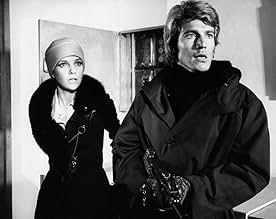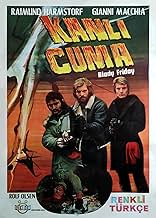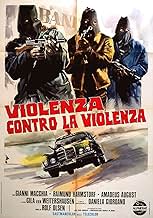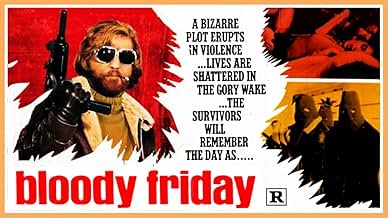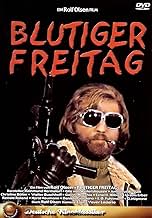Füge eine Handlung in deiner Sprache hinzuWhen terrorists rob a bank all hell is let loose.When terrorists rob a bank all hell is let loose.When terrorists rob a bank all hell is let loose.
- Regie
- Drehbuch
- Hauptbesetzung
Totò Mignone
- Franz Muhl
- (as Ottone Mignone)
Claudius Casagrande
- Niki
- (Nicht genannt)
Robert Furch
- Mann im Justizpalast
- (Nicht genannt)
Karin Glier
- Nickys Mutter
- (Nicht genannt)
Imo Heite
- Amerikanischer Soldat
- (Nicht genannt)
Empfohlene Bewertungen
Womansing thug (Harmstorf) is sprung from the courthouse by two accomplices, then sets about planning the big heist of a local bank, equipped with a cache of high-powered weapons he's acquired from an American army outpost. Together with his faithful protégé (Macchia), who reluctantly on-boards his young girlfriend (Bohm) and her AWOL brother (August), the quartet bumble their way through the supposedly full-proof plan that aims to deliver them a cool million in cash and a new life in Australia. Predictably, things deteriorate quickly at every turn.
Harmstorf struts around in tight leather trousers, dropping C-bombs and picking fights he never wins with confidence and virility, an utterly repugnant and degenerate character. His internal adversary, the more even-tempered August character proves to be impotent to both the affections of one of the hostages, and to Harmstorf's increasing lunacy, remaining compliant in the hope of protecting his sister (Bohm) from harm. Generally the acting seemed pretty committed, although at times the atrocious dubbing makes it a mockery.
Paints a fairly miserable picture of working class Munich, often vulgar and violent, yet strangely engaging. The pitiful attempts by the gang to execute their plan, the constant set-backs, and Harmstorf's unbending belief that they'll all be free and filthy rich in spite of the escalating odds is worthy of the deepest sympathy. The climax was a bit disappointing but remained consistent with the overall tone, and while the jazz-pop soundtrack and dubbing will annoy some viewers, if you're not too picky, you might enjoy this quirky Bavarian bank robber flick.
Harmstorf struts around in tight leather trousers, dropping C-bombs and picking fights he never wins with confidence and virility, an utterly repugnant and degenerate character. His internal adversary, the more even-tempered August character proves to be impotent to both the affections of one of the hostages, and to Harmstorf's increasing lunacy, remaining compliant in the hope of protecting his sister (Bohm) from harm. Generally the acting seemed pretty committed, although at times the atrocious dubbing makes it a mockery.
Paints a fairly miserable picture of working class Munich, often vulgar and violent, yet strangely engaging. The pitiful attempts by the gang to execute their plan, the constant set-backs, and Harmstorf's unbending belief that they'll all be free and filthy rich in spite of the escalating odds is worthy of the deepest sympathy. The climax was a bit disappointing but remained consistent with the overall tone, and while the jazz-pop soundtrack and dubbing will annoy some viewers, if you're not too picky, you might enjoy this quirky Bavarian bank robber flick.
In this hard-boiled German-Italian production, Heinz Klett (Raimund Harmstorf), an anarchistic, mad-dog criminal, orchestrates a tricky escape from a Munich courthouse, right out from under the noses of police guards. With his gang -- Luigi (Gianni Macchia), Army deserter Christian (Amadeus August), and Christian's pregnant sister, Helen (Christine Böhm) -- Heinz next plans to rob the Deutsche Finanzbank so he can escape Germany and retire.
The heist is a bungled affair, as there isn't much money in the vault. But the robbers take ten hostages, including the heiress to a supermarket empire, and capitalize on the situation by demanding a million dollars in ransom and various modes of transportation out of the country. The police must contend with both the robbers and citizens who try to take over the investigation at every turn. In a marked contrast to how an American action film might depict a similar crisis, the cautious German constabulary readily accedes to all of Heinz's demands.
When Heinz and company receive the ransom money, they hijack a few of the hostages, including the heiress and a lesbian businesswoman who isn't impressed by Heinz's macho posturing. They get sidetracked to a country cabin, where the robbers' loyalties deteriorate. When a sympathetic Christian helps the heiress escape, she tips off the cops. Heinz rapes and murders the lesbian, while Luigi dies from an accidental gunshot wound. The cops surround the cabin and gun down Heinz, Christian, and Helen.
BLOODY FRIDAY is remarkable for not glamorizing its criminal protagonists, which was not the norm for crime movies of the late 60s and early 70s. It is only when the robbers are finally ambushed that director Rolf Olsen's staging makes a play for sympathy -- be they misguided youth or misunderstood human trash, did they deserve to die? Well, yes.
Olsen, who was more comfortable dabbling in lightweight sex films and mondo's, crams enough incident into the plot to keep our interest. The robbers' heist and subsequent flight from justice recalls every cliche in the book, but some scenes are remarkable -- the suspenseful escape from the courthouse; a toddler carrying a hand grenade outside the bank as if it were a toy; the massacre of the protagonists (equipped with extra large blood squibs); and a remarkably unpleasant rape scene, which is superimposed over slaughterhouse and, if you watch closely, hardcore sex footage.
Most of the cast underplays, which makes Harmstorf's intense performance as Heinz seem better than it is. However, his "Sea Wolf" is amusingly trashy, that of a cigar-chomping, machine gun wielding psychotic.
For those with a background in the social climate of 1972 Germany, one can discern the film's political subtext, with pointed references to Baader-Meinhof and the climate of social malaise that motivates the desperate thieves, as well as the ease with which they nab guns and start terrorizing the upper-class establishment.
The heist is a bungled affair, as there isn't much money in the vault. But the robbers take ten hostages, including the heiress to a supermarket empire, and capitalize on the situation by demanding a million dollars in ransom and various modes of transportation out of the country. The police must contend with both the robbers and citizens who try to take over the investigation at every turn. In a marked contrast to how an American action film might depict a similar crisis, the cautious German constabulary readily accedes to all of Heinz's demands.
When Heinz and company receive the ransom money, they hijack a few of the hostages, including the heiress and a lesbian businesswoman who isn't impressed by Heinz's macho posturing. They get sidetracked to a country cabin, where the robbers' loyalties deteriorate. When a sympathetic Christian helps the heiress escape, she tips off the cops. Heinz rapes and murders the lesbian, while Luigi dies from an accidental gunshot wound. The cops surround the cabin and gun down Heinz, Christian, and Helen.
BLOODY FRIDAY is remarkable for not glamorizing its criminal protagonists, which was not the norm for crime movies of the late 60s and early 70s. It is only when the robbers are finally ambushed that director Rolf Olsen's staging makes a play for sympathy -- be they misguided youth or misunderstood human trash, did they deserve to die? Well, yes.
Olsen, who was more comfortable dabbling in lightweight sex films and mondo's, crams enough incident into the plot to keep our interest. The robbers' heist and subsequent flight from justice recalls every cliche in the book, but some scenes are remarkable -- the suspenseful escape from the courthouse; a toddler carrying a hand grenade outside the bank as if it were a toy; the massacre of the protagonists (equipped with extra large blood squibs); and a remarkably unpleasant rape scene, which is superimposed over slaughterhouse and, if you watch closely, hardcore sex footage.
Most of the cast underplays, which makes Harmstorf's intense performance as Heinz seem better than it is. However, his "Sea Wolf" is amusingly trashy, that of a cigar-chomping, machine gun wielding psychotic.
For those with a background in the social climate of 1972 Germany, one can discern the film's political subtext, with pointed references to Baader-Meinhof and the climate of social malaise that motivates the desperate thieves, as well as the ease with which they nab guns and start terrorizing the upper-class establishment.
Heinz is a bit of a nutter. While heading to court, he manages to escape with the help of his mates and gives two policemen a severe beating for their troubles. Hunted nationwide, Heinz plans to rob a bank and start a new life in another country, with the help of his Italian mate and his girlfriend Helen, plus Helen's brother Christian, an AWOL soldier who is a last minute replacement for a guy who was captured during Heinz's escape.
Christian is reluctant to help and does so only to protect his sister, but he becomes more worried about the whole situation when Heinz starts displaying not-so-sane tendencies, including nearly murdering to American soldiers they were robbing for explosives. He goes ahead with the plan however, which turns out to be more complicated and dangerous than he thought, and things go wrong almost right away when a small child picks up a hand grenade that Heinz dropped on the way into the bank...
Okay, there's not much plot to be honest, but it's a good film nonetheless, mostly due to gigantic actor Raimund Harmstorf as the psychotic Heinz and his interactions with his hostages, plus his confidence that his plan is going to work, despite the self-evident truths. This is also a film that doesn't skimp on the violence, especially when a cop jumps on a hand grenade to protect the public. It's the goriest part of the film and something that was sure to shock audiences back in the day. Ah, the seventies.
Grim from beginning to end. What else can I say?
Christian is reluctant to help and does so only to protect his sister, but he becomes more worried about the whole situation when Heinz starts displaying not-so-sane tendencies, including nearly murdering to American soldiers they were robbing for explosives. He goes ahead with the plan however, which turns out to be more complicated and dangerous than he thought, and things go wrong almost right away when a small child picks up a hand grenade that Heinz dropped on the way into the bank...
Okay, there's not much plot to be honest, but it's a good film nonetheless, mostly due to gigantic actor Raimund Harmstorf as the psychotic Heinz and his interactions with his hostages, plus his confidence that his plan is going to work, despite the self-evident truths. This is also a film that doesn't skimp on the violence, especially when a cop jumps on a hand grenade to protect the public. It's the goriest part of the film and something that was sure to shock audiences back in the day. Ah, the seventies.
Grim from beginning to end. What else can I say?
This is just a great, over the top story of a bank heist gone wrong with the greatest bad boy of movie history, Raimund Harmstorf. Chock full with (visual) violence, cheap FX and really the greatest trash talk of all times. And Gila von Weitershausen as the naive bit on the side isn't too bad either.
Relentlessly tough and mean-spirited bank robbery drama is straightforwardly made as a sleazy actioner, populated throughout with disagreeable characters, but actually is not any much more than that (despite having gained a certain cult status).
Wusstest du schon
- WissenswertesIn 2015, Subkultur Entertainment started a crowdfunding campaign via Kickstarter to restore the film which was successful. During the restoration it was discovered that the soundtrack was longer than the film itself. This resulted in raiding the vaults at the production company Lisa Film. There, a film reel was discovered which contained scenes cut to obtain a rating from the FSK. In the end, the original director's cut was restored in 4K resolution.
- Alternative VersionenGerman theatrical version was cut to secure a "Not under 18" rating. Only in 2017 the uncut version was released on DVD/Blu-ray.
Top-Auswahl
Melde dich zum Bewerten an und greife auf die Watchlist für personalisierte Empfehlungen zu.
Details
- Laufzeit
- 1 Std. 34 Min.(94 min)
- Seitenverhältnis
- 1.66 : 1
Zu dieser Seite beitragen
Bearbeitung vorschlagen oder fehlenden Inhalt hinzufügen

